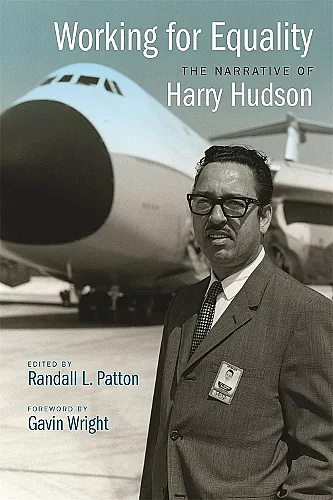Working for Equality
The Narrative of Harry Hudson
Harry Hudson author Randall L Patton editor
Format:Paperback
Publisher:University of Georgia Press
Published:15th Nov '19
Currently unavailable, and unfortunately no date known when it will be back

A rare look at the personal costs— and benefits—of black achievement in the postwar corporate world
Harry Hudson, the first African American supervisor at Lockheed Aircraft’s Georgia facility, recalls his thirty-six-year career that spanned the postwar civil rights movement and the Cold War. While not a civil rights activist, he knew he was helping to break down racial barriers that had long confined African Americans to lower-skilled jobs.
“When I went to work for Lockheed-Georgia Company in September of 1952 I had no idea that this would end up being my life’s work.” With these words, Harry Hudson, the first African American supervisor at Lockheed Aircraft’s Georgia facility, begins his account of a thirty-six-year career that spanned the postwar civil rights movement and the Cold War.
Hudson was not a civil rights activist, yet he knew he was helping to break down racial barriers that had long confined African Americans to lower-skilled, nonsupervisory jobs. His previously unpublished memoir is an inside account of both the racial integration of corporate America and the struggles common to anyone climbing the postwar corporate ladder. At Lockheed-Georgia, Hudson went on to become the first black supervisor to manage an integrated crew and then the first black purchasing agent. There were other “firsts” along the path to these achievements, and Working for Equality is rich in details of Hudson’s work on the assembly line and in the back office. In both circumstances, he contended with being not only a black man but a light-skinned black man as he dealt with production goals, personnel disputes, and other workday challenges.
Randall Patton’s introduction places Hudson’s story within the broader struggle of workplace desegregation in America. Although Hudson is frank about his experiences in a predominantly white workforce, Patton notes that he remained “an organization man” who “expressed pride in his contributions to Lockheed [and] the nation’s defense effort.”
Overall, Hudson has provided historians interested in the history of labor relations a valuable resource. His firsthand account about the integration of the Lockheed-Georgia plant is filled with great stories of his encounters with management, other workers, unions, the U.S. military, and the various suppliers for the aircraft industry.
-- W. Marvin Dulaney * Journal of Southern HistoISBN: 9780820356884
Dimensions: unknown
Weight: unknown
248 pages